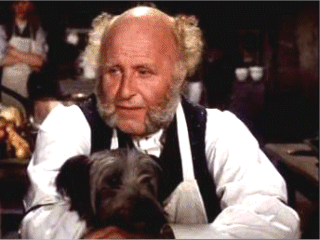I remember….
When I was a child, our family lived in a rented house, and our television was
still monochrome. Every Sunday afternoon we (me, my mom, and dad) would sit
calmly in front of our TV, and excitedly waiting for one familiar theme song,
and the scene of a prairie with its long grass, where from afar came a little
girl with her dog ran across. Yes, it was the famous TV series of Little House on the Prairie. It was my
family’s favorite, and it always sent warmth to my heart to see one family that
was bound together by love and kindness. Thirty years after, I still remember
that scene, that exciting anticipation, that theme song, and that warm feeling,
all over again while reading the original book at last.
Little House on the Prairie (number
three) is one of eight Little House
series Laura Ingalls wrote about her childhood as pioneer in the 19th
century. It covers the period when the Ingallses move from the “Big Woods” of Wisconsin
to Indian Territory of Kansas. Pa Charles Ingalls has received information that
the government would soon open settlement for the whites, and so he immediately
packs their belongings on the wagon, takes a long way to Kansas, and finally settles
on the prairie before anybody else, so they can pick the best part. The family
(Pa Charles, Ma Caroline, Mary, Laura, and baby Carrie) must start all over
again to have a comfortable home. Laura tells us in details how his father
builds their log house literally alone, the stable, and the furniture, and is
only occasionally helped by their neighbors: Mr. Edwards and Mr. Scott.
Throughout
the book Laura describes beautifully how she sees the prairie’s nature. My
favorite scene is
the nightingale song; it’s so serene and majestic! But
their life is not always peaceful; there were the wolves which scare them at
night. But the more dangerous is the presence of the Indians. Pa Ingalls’
confidence proves to be wrong; the land where they have built the house is actually
the Osage tribe’s reservation. After reading how the Indians have been cruelly
treated by the whites at
Bury My Heart at Wounded Knee, it was
interesting to read about them from the white settlers’ perspective.
There are mixed
feelings among the pioneers. Mr and Mrs Scott seem to believe “the only good Indian is the dead Indian”.
Ma and Mr. Edwards might not be that strict, but they dislike the Indians very
much. Only Pa is sensible enough to try to make good relationship with them. At
one occasion, he even sits and smokes with an Indian in front of the fireplace.
And the Indian then saved them when other Indian tribes want to harm the
whites. In the end of the chapter about the horrible war cry of the Indians,
which makes everybody sleepless at night, Laura tells us that ‘no matter what
Mr. Scott said, Pa did not believe that the only good Indian was a dead Indian’.
I too have mixed
feelings about this book. Had I read this in childhood, it might have been my
favorite, and I would have praised it very high. But, as an adult, and because
I have just read an awful history of the Indians and the whites, well… in the
end I was troubled as much as I was entertained by this book. Pa Ingalls is
kind enough to not make the Indians his enemy, but on the other hand he is just
the same as those white settlers, who, knowing that they have settled on an
Indian Territory, still claim the land as theirs. They just don’t want to think
about the Indians; it’s enough that they don’t harm their families.
Laura’s discussion
with her Pa echoed my thought:
Pa: “White people are going to settle all this
country, and we get the best land because we get here first and take our pick.
Now do you understand?”
Laura: “Yes Pa. But, Pa, I thought this was Indian
Territory. Won’t it make the Indians mad to have to—“
Pa: “No more questions, Laura. Go to sleep.”
The way Pa
sharply interrupts Laura’s phrase only shows that his conscience actually troubles
him, but he shuts it up to justify his decision to settle there. He knows that it
is only rumors that the government will open settlement, but he hurries up
there in order to get the best land. It is only another proof how the whites are
greedy by nature, although some of them are good and kind-hearted as Charles Ingalls.
But…. enough
of the dark atmosphere of human injustice! Let’s talk about love, because (almost)
throughout the book, Laura always speaks about love; the warmth of family life.
I admire Mr. Edwards, their bachelor neighbor, who on Christmas day takes
troubles within the thick freezing snow, only to get to the city’s store to buy
presents for Mary and Laura. How sweet and touching is that scene! The
Christmas spirit is really there….
And for all
that…. I granted four stars for Little
House on the Prairie.
~~~~~~~~~~
I read Harper Trophy (Harper Collins) paperback edition
This book is counted
as:


































